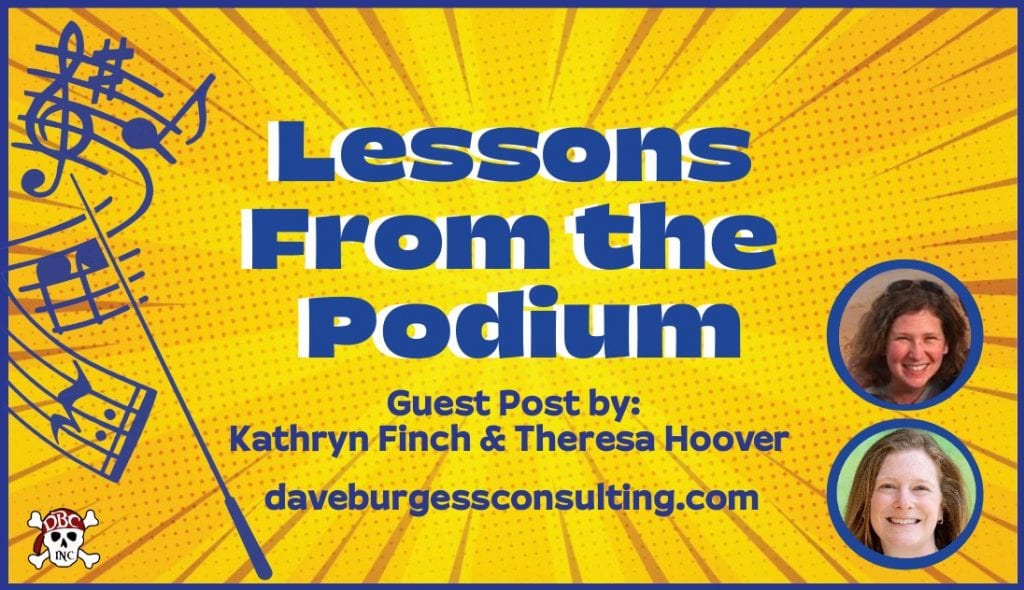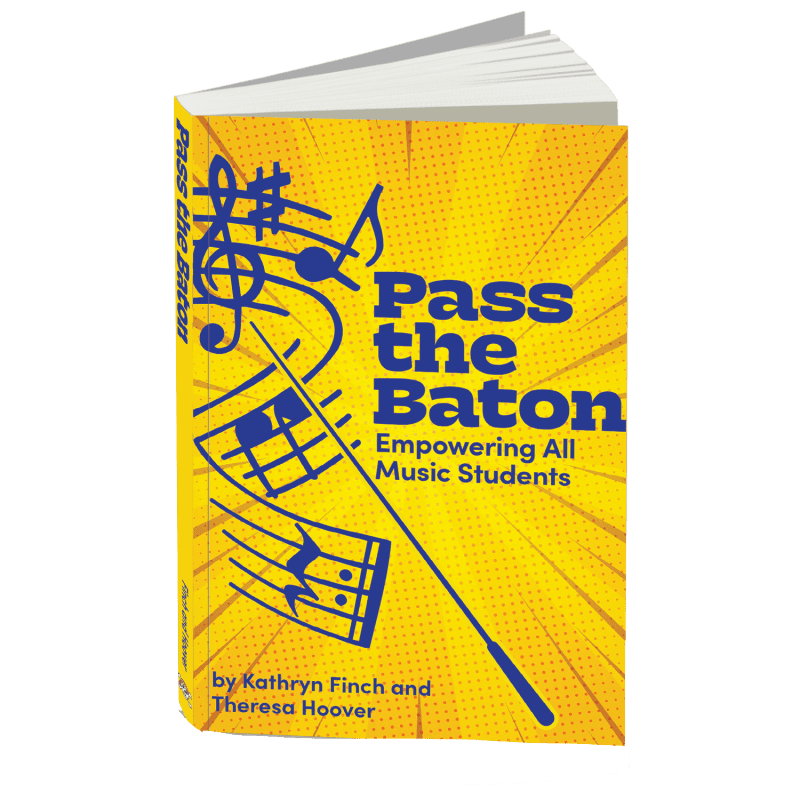We are honored to have the authors of Pass the Baton, Kathryn Finch and Theresa Hoover as our special guest bloggers today!
Their new book, Pass the Baton. has been topping the Amazon charts since day 1! We are pumped to bring this book to music educators around the world.
All too often, the music classroom stifles students with one-size-fits-all curricula and repertoire. In Pass the Baton, authors Kathryn Finch and Theresa Hoover turn that paradigm on its head, offering a vision of music education that empowers students as critical thinkers who exercise voice and choice to question, discover, connect, and play like never before—in and out of the classroom. Be sure to click the link below this post and learn even more about this manifesto!
But, first... let's hear from the authors.
Take it away, ladies!
Guest Blog by Kathryn Finch and Theresa Hoover
We are taught many things as musicians - proper posture, breathing techniques, counting - and similar concepts relevant only to other musicians. However, many of these valuable lessons we learned from making music also apply to our teaching. In fact, they are lessons that all teachers, regardless of subject area, could benefit from remembering in their own classrooms!
Start Slow to Go Fast
When learning a new or challenging piece of music, many young musicians will try to practice it too fast. They play the same thing repeatedly at an unattainable speed, not making much progress. The key to success, however, is to find the spot in the music that is difficult (which might not be the beginning) and practice it at a speed so slowly you cannot possibly make a mistake. Repeat that a few times, and then gradually increase the tempo as mastery of each new speed is achieved. By slowing down and practicing this way, you will eventually be able to perform the music at the faster tempo.
How often do we make this mistake in our classrooms? We try to rush through content to make sure we “cover” it all. In reality, rushing through does not help anyone achieve mastery. Instead, we could better serve our students by breaking down the content, isolating the challenging parts, and working on it slowly. When we slow down and take new skills one step at a time, only moving faster when ready, we increase our student’s chances of success.
Quality Over Quantity
Many musicians question how long they should practice their instruments. How many minutes or hours a day does it take to be proficient? The truth is, the time doesn’t matter as much the quality of the practice during that time. A focused 30-minute practice session has more value than a haphazard 2-hours any day! The most successful musicians have discovered how to make the most of their practice time, so each minute counts.
Time in the classroom is just as limited as time in the practice room - especially in 2020! How can we focus on the quality of each minute with the students, instead of only worrying about the quantity of information or assignments we give them? We must ensure that each activity the students complete is valuable and a good use of their time. Consider incorporating a higher-level thinking task that will help students better process and retain the content through evaluation and analysis, instead of numerous lower-level tasks that only require students to recall information. Also, remember that for some students, completing fewer tasks correctly will have more value than completing many with significantly less accuracy. We can teach students these concepts too, encouraging them to value their quality over quantity.
There’s Nothing Wrong With Simplicity
There are many virtuoso musicians who have impressed audiences with their ability to perform the most complex and intricate music. Instrumentalists whose fingers appear blurry at the speed they move, or singers whose range and power are unmatched. But other musicians have found you don’t need to use every available note and technique to make great music. Take Duke Ellington’s C Jam Blues, for example. The entire melody can be played on just two notes - C and G! Though simple, this melody has become a jazz standard, performed by countless professional, amateur, and student musicians. Ellington could have used many additional notes but kept it simple.
Teaching in 2020, we have access to so many websites, apps, and books it can be overwhelming. It’s easy to get caught up in using “all the things” in our instruction. But do we need to? Instead, could we find two or three great resources and focus on those? By simplifying what we give students, we allow them to center their attention on the content and not the tool. And don’t worry - just like some musicians in Ellington’s orchestra had the freedom to improvise solos using additional notes, you can provide additional resources for students who need extension or remediation options. Keeping things simple doesn’t mean less quality or less work; it just means the message is strong. Students can gain confidence and show independence in their work. Teachers can dive deeper into an objective to ensure a strong understanding of the concept.
Failing is Part of the Process
Share with students that failing is part of the learning process. Recently, our music students interviewed a musician from “The President’s Own” United States Marine Band. This trumpet player shared that he auditioned for the band ten times before being selected. Each time about 80 people auditioned and only one made the band. He learned from every audition how to improve for the next one, what to expect, and to not give up. Pianist and composer Sergei Rachmaninoff failed miserably early in his career. Rachmaninoff had doubts going into his Symphony No. 1 premiere and unfortunately, many critics agreed, giving it awful reviews. He easily could have quit composing at that point, and while it wasn’t easy, three years later he found great success.
We have to remind ourselves and our students that we won’t always be successful the first time. There will be lessons that don’t go well. If we stop after one thing goes wrong, we are doing ourselves a huge disservice. Instead of throwing out the lesson and giving into the failure, we can shift our thinking to see an opportunity for change. As for our students, we can remind them that failures tell us what needs more work. With a growth mindset, we can continue to improve until we find success.
There’s No Such Thing as an Overnight Success
So many of us don’t think about what happens before someone becomes successful. When a new artist emerges, we are impressed by their “overnight success.” But none of it happened overnight! There were likely years of work that took place before the public saw or heard anything. Lady Gaga, Stefani Joanne Angelina Germanotta, is a great example. People were amazed when her first album, The Fame, debuted in 2008. Many assumed Gaga was just getting her start as a musician, when in fact her musical training began at four-years-old and continued through her attendance at NYU’s Tisch School of the Arts. Lady Gaga’s career didn’t happen overnight, it happened because she worked for it.
Students can get frustrated when something doesn’t come easy to them - teachers can feel this way too - especially if they’ve seen someone else make it look easy. What they are forgetting is how much time and effort was put in. There’s a great quote from Band Directors Talk Shop: “Every great musician was once a beginner.” This is true in every area of life! Remind students that everyone starts at the beginning, even those who make it seem easy.
Put Down the Baton and Let the Musicians Make Music
Conducting is no different than playing an instrument, in that conductors spend hours honing their craft and improving their musicianship. Conductors practice gestures, technique, repertoire, and even facial expressions, so they can convey musical intent to the ensemble. However, a conductor who tries to control every beat of the music only ends up stifling the musicians! The most successful conductors have learned there comes a time when it’s best to take a step back and let the musicians make music. The conductor is still there as a guide, but trusting the ensemble allows the magic to happen.
As teachers, we are the experts in the room. We’re expected to know all the answers, or at least know where to find them. Sometimes the tendency is to hold on to this expert-status, working to control everything that happens in our classrooms since “teacher knows best.” In reality, it’s okay to let go. In fact, when you let go, the results may surprise you! Find times to step back and let the students take the reins. Let them explore a tangent or grapple with a challenge. Allow the students to determine the next steps for a project, or choose which topics to dive deep into. Trust that you have trained them well. Put down the baton and let the musicians make music.
While we navigate this challenging school year, we can find reassurance in these lessons from the podium. Take it slow, keep things simple, and remember that learning is a process. . We can keep those in mind and always do what’s best for our students.
-Kathryn & Theresa
Thank you, Kathryn & Theresa!
Thank you, Kathryn & Theresa!.
Love this post!
We appreciate you sharing this incredible message! If you don't already, follow Kathryn on Twitter @Singingfinch1 and Theresa on Twitter @MusicalTheresa. Also, check out their website Passthebatonbook.com. Also, they have Book Study Resources.!
And, of course, you don't want to miss reading Pass the Baton--their manifesto, Click HERE for a FREE preview today!
Pass the Baton
Taking the Music Room beyond Engagement
More info →





